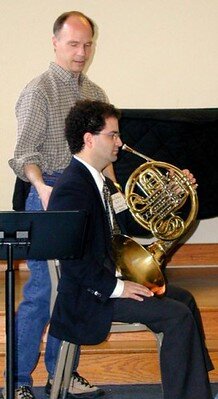How the Alexander Technique can benefit musicians, and others with Repetitive Stress Injuries.
Alexander Technique for Musicians
Alexander Technique & the Musical World

Almost as renowned as the Alexander Technique’s association with Acting and Voice is its use by professional musicians. The Royal College of Music, Royal Academy of Music, and Julliard (for example) all have included private and group Alexander classes in their instrumental music curricula for more than 60 years, and for good reasons.
Watch my talk & mini-lesson with cellist Sasha Ono of the Lotus Chamber Music Collective (skip to approximately 4:30):
Musicianship, Musicality, and Repetitive Stress Injuries

When a musician walks in my door, the first point for them experientially to understand is that they are their instrument, first. Period. Not the piece of equipment they’ve dutifully lugged to my office; their entire Selves. If they don’t possess accurate awareness and facility around how they coordinate their bodies with their minds/emotions offstage, they cannot achieve mastery of a musical instrument or enjoy a long, healthy, professional music career.
In lessons, we are (playfully) looking at what appropriate muscular tone/tension is in you. In everything you do. String players (including pianists) understand that to tune something you have to loosen the strings first. By learning how to notice and how to release (if you choose to) unnecessary muscle tension in your “normal” life activities, your movements while playing your (secondary) instrument re-coordinate, becoming freer and faster. Your breathing naturally improves, without exercises. Many other aspects of musicianship (control, specificity, and economy of movement) can be addressed through Alexander classes.
Forty years ago, after one of my concerts, Adrian Boult told me that if I continued to conduct like that I’d become a cripple, and that I must take lessons in the Alexander Technique. Today I am still having lessons – as with music, there is no end to the learning process. It affects not only the use of the body, but also one’s views of oneself and one’s behavior. For the aches and ills that come with the years, the Technique can work miracles.
-Sir Colin Davis (Conductor)
As you gain improved awareness and control over your own dynamic coordination and mental chatter, your flow, your breathing, your emotional expressiveness and quality of sound improve. People typically report feeling livelier and lighter, more balanced, and more in touch with their emotions. Because Alexander deals with how we react (in the moment), calming the nervous system, many performers use the work to address performance anxiety or “stage fright.”
With 84% of professional orchestra musicians reporting work-related Repetitive Stress Injuries at some point in their careers, the Alexander Technique offers an invaluable tool for preventing injury, managing pain, and enjoying a lifetime of playing.
Schedule Online or In-Person Classes!
Book Now













